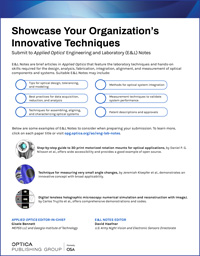Applied Optics' Engineering and Laboratory Notes
Engineering and Laboratory Notes (E&L Notes) are concise articles that share useful laboratory techniques and practical engineering approaches in the applied optics field. Topics range from design and analysis, to fabrication and integration, alignment, testing, and calibration of optical systems. E&L Notes offers a unique way to publish useful techniques from your engineering notebook in Applied Optics.
While E&L Notes are especially beneficial for optics professionals in industry, applied research, and government labs, the academic community can utilize them in the classroom as valuable tools for sharing time-tested techniques with the next generation of the applied optics community. Submissions may come from any of these groups.
Suitable E&L Notes may include:
- tips for optical design, tolerancing, and modeling
- best practices for data acquisition, reduction, and analysis
- techniques for assembling, aligning, and characterizing optical systems
- methods to integrate optical systems with mechanical, electrical, or other external systems
- measurement techniques and methods to validate system performance
- patent descriptions and approvals
Submissions will be reviewed by the E&L Notes Review Panel, and a decision on publication will be made by the E&L Notes Features Editor. Original research is not appropriate for E&L Notes and such articles will be returned to authors or referred to other Applied Optics editors. Acceptance criteria for E&L Notes will focus on the utility and reproducibility of the techniques described, the scope of their application, their relevance to Applied Optics, as well as their overall clarity and correctness. Submissions are expected to be concise and generally shorter than a research paper.
A successful submission will address, as applicable, key assumptions; hardware and software requirements; set-up alignment and calibration procedures with a detailed verification process; standards and/or references used; a description of sampling methods used; and helpful short-cuts or other tips/tricks.
Applied Optics encourages supplementary materials to E&L Notes such as videos, 2D image files, 3D solid models, infographics, process flow charts, example test data, and data-processing scripts. References to externally hosted design and modeling files from optical design programs are also encouraged.
Click here to see the review criteria.
View the collection of E&L Notes here.
Submit
Encourage your colleagues to submit E&L Notes by downloading and sharing this flyer. Examples of published E&L Notes are included.
